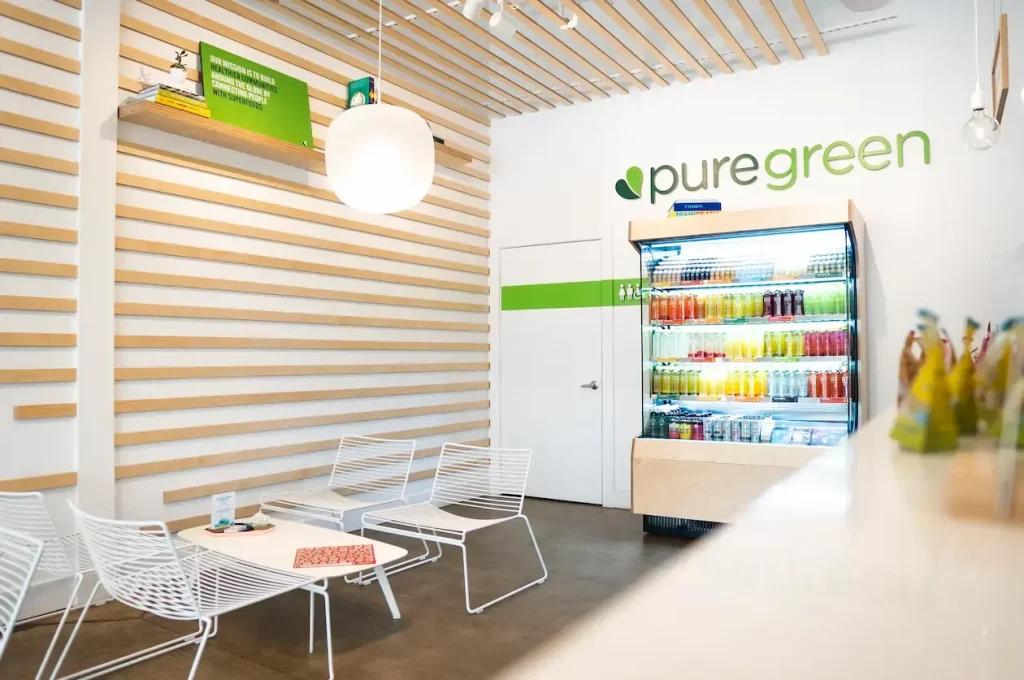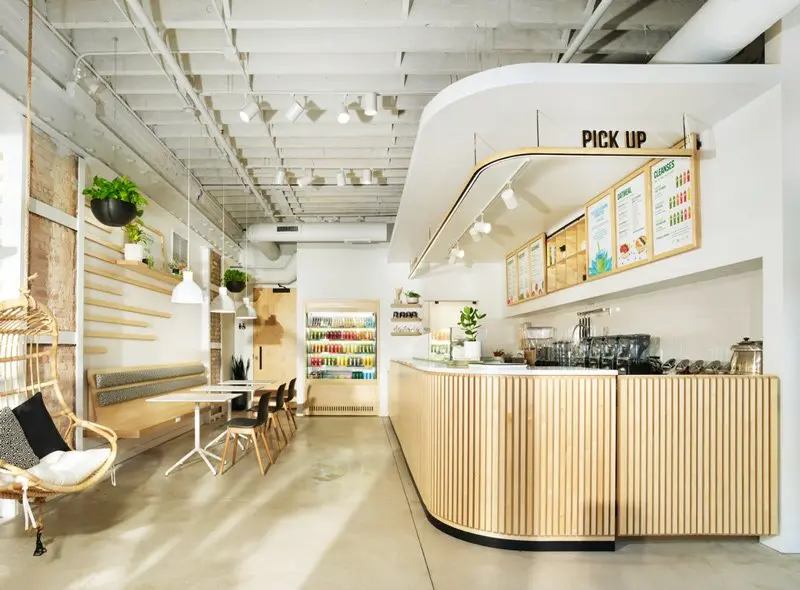
Pros and cons of opening a franchise
As you’d probably expect, there are countless different ways to potentially run a business. While some people want to create their own brand from scratch, other prospective business owners might want to benefit from an already existing brand, such as a franchise.
Franchises are used for all sorts of types of enterprises but are especially popular within the food and beverage industry. By starting a juice bar franchise, for example, you can benefit from immediate name recognition and you should be able to get your business up and running in a very short amount of time.
Of course, as you’ll find when making any sort of major business decision, you’ll want to consider both the benefits and drawbacks of opening a new franchise location. There are many benefits to opening a franchise versus opening your own business, but there are some downsides to undertaking such an endeavor as well.
When considering the pros and cons of opening a franchise, it’s essential to weigh the advantages such as established brand recognition, support from the franchisor in terms of marketing and operations, and access to a proven business model. These factors can significantly reduce the risks typically associated with starting a new business.
For instance, a juice bar franchise comes with a ready-made customer base familiar with the brand, which can lead to quicker profitability compared to starting a brand new juice bar. Additionally, franchises often provide comprehensive training programs and ongoing support, which can be invaluable for new entrepreneurs who might not have extensive experience in the food and beverage industry.
However, the cons of opening a franchise should also be carefully considered. Franchisees often face high start-up costs, ongoing royalty fees, and less creative control over their business. This can be particularly challenging for those who have a specific vision for their juice bar and wish to offer unique products or services.
Moreover, the success of your franchise can be heavily dependent on the franchisor’s reputation and business decisions, which are out of your control. This interdependence means that any negative publicity or poor decisions made by the franchisor can directly impact your franchise’s performance. Understanding these pros and cons is crucial in determining whether opening a franchise aligns with your business goals and personal preferences.
In this guide, we will discuss some of the most important things you need to know about starting a juice bar franchise, including how a juice bar franchise actually works, along with various pros and cons. By taking the time to know the ins and outs of operating a juice bar franchise, you’ll be able to decide if opening one is right for you.
How Does a Juice Bar Franchise Work?
Before we take a deeper dive into the pros and cons of owning a juice bar franchise, let’s start by defining what a juice bar franchise actually is.
First, let’s start by formally defining a franchise. A franchise, according to the International Franchise Association (IFA), is “a method of distributing products or services involving a franchisor, who establishes the brand’s network or trade name and a business system, and a franchisee, who pays a royalty and often an initial fee for the right to do business under the franchisor’s name and system.”
In other words, a franchise is a system where business owners can pay to have immediate access to a brand, distribution network, and various other important resources, such as marketing support, legal support, accounting support, and more.
The “plug and play” nature of the franchise system has caused it to become very popular in the United States and, in many cases, profitable for both the franchisor and the franchisee alike. As suggested, one of the sectors you are most likely to encounter a franchise is the food and beverage sector—this is because not only does this sector rely on having access to a pre-existing distribution network (allowing you to get fresh fruits, other ingredients, etc.) but it is also a sector where brand recognition plays a very important role.
A juice bar franchise will use this exact business model. Juice bars first started to become popular in the United States in the 1970s and have become considerably more popular as time has gone on. Today, there are thousands of juice bars across the country, with a particularly high concentration of locations on the west coast.
The exact dynamics of the juice bar franchise system will depend on the wants and needs of both the franchisor and the franchisee. These dynamics, ideally, will be clearly spelled out in your initial franchise agreement.
Still, it is clear why so many juice bar and other business owners continue to utilize the franchise system. Let’s take a closer look at some of the most obvious pros and cons of opening a juice bar franchise.
Pro: Built-in Business Model
One of the hardest parts of opening a new smoothie bar is developing a business plan that is solid and successful. And if you are starting a juice bar from scratch, that means you are going to have to create all of the useful benefits of a franchise—branding, marketing, operational support, distribution, etc.—entirely from scratch. That takes a considerable amount of time and even if you have a great idea for an independent juice bar, your revenue streams and breakeven point will be significantly delayed.
But when you buy in as a franchise owner, you know right away that the business model works. Typically, more successful businesses tend to delve into the world of franchising than not, so you have a greater sense of security than going at it at your own. You essentially get to skip the startup stage in which you have to write a business model, do product testing, and work on scaling up the business. All of this work has already been done for you by the franchisor—that means profits and expansion can both be expected much sooner.
Con: Lack of Creative Control
One of the biggest downsides to owning a franchise for some is that you have to abide by all of the stipulations made by the parent company. Think you know a better way to do something? You’ll have to run it by corporate. Want to add something to your juice blends? Not without checking with the franchisor.
Everything has to get approved. Franchise success is often based on their predictability. Customers want to know what to expect when they walk into your juice smoothie bar, but this can be frustrating for business owners who have a lot of big ideas about how to run everything.
Naturally, this begs the question: why do franchisors take creative control so seriously? After all, the idea of having to ask to put up an in-store ad might seem a bit ridiculous at first. But the control over creativity is necessary because the uniformity of the franchise model is what helps create brand value. Imagine if every McDonald’s had a different “M” logo instead of the universally recognized golden arches; the brand itself would lose its value.

Pro: Corporate Support System
Opening a franchise also comes with a lot of built-in support from the corporate offices. The best juice bar franchise will have people to help with location scouting, marketing, and hiring right from the get-go. When you open your own juice business, you have to figure out how to manage all of these different things on your own, but with a franchise, you have a lot of support along the way. A franchise agreement gives more corporate support to the franchisor. Small business owners do not get these benefits. These benefits are only for those who are grabbing franchise business opportunities.
Franchise owners also provide franchise consultants. Franchise consultants provide suggestions about franchise location, business model, prospective franchisee, franchise opportunity, initial franchise fee, franchise brand, real estate, royalty fee, and also franchise system. If you want to convert your existing business or small business to a potential franchisee then you must need corporate support.
Franchise development with corporate support is easy rather than blindly entering the competitive juice industry. And this support can really pay off because, frankly, franchise owners only have so much time in a given day and there is also so much about running a business they can handle on their own. The combination of expertise, resources, and experience that the franchise model immediately provides can help juice bar owners establish an instant competitive advantage.

Con: You're Locked into a Contract
The franchise contracts can be quite intense, so it’s important to read them carefully before entering into any kind of agreement. One misstep can sometimes lead to you losing your entire business, and since you don’t own any of the proprietary information, it is very hard to fight these claims. Alternatively, it can also be hard to close up shop if you feel your gross profit is dwindling, or just simply want to move on. You generally have less freedom over the future of the location.
Your franchise agreement will almost certainly have a clause that will allow you to close your franchise or exit the contract if needed (of course, you won’t be able to use any of the branding and benefits any more). However, these clauses usually impose some sort of cost, so be sure not to sign anything you aren’t entirely confident you understand.

Pro: Brand Recognition
This one is definitely a huge pro: when you open a franchise, people are already familiar with the brand, what the company does, and the quality of the products, so you already have a loyal customer base. Franchisees are often successful because a new franchise opens in an area where known customers live which will make it more convenient for them to access the business.
People may love the product that you sell, but if it’s too far from their home, it is less likely that they will venture to get it. But by opening franchises in strategic locations, you can tap into all of those existing customers and quickly expand your customer base.
You should choose the right franchise, customer service, and franchise model for your business startups. Liquid assets (and we’re not just talking about juice, here) are also important for getting franchise ownership. Opening a new franchise will require a little bit of careful planning—but once you are able to do so, the flow of customers could be immediate.
Con: Reputation Management Issues
One other downside of owning a franchise is that any issues of reputation that the larger company is experiencing will affect your business as well. If a scandal breaks or bad press comes out about overall company practices, even if you don’t abide by that or had no idea what was going on, you could see your business affected. You need to maintain proper franchise law.
These reputation challenges can be frustrating because, in many cases, they will be entirely beyond your ability to control. If someone gets food poisoning at another franchise location, for example, then your own location might experience a temporary setback. However, at the very least, you will benefit from your franchise-wide PR department.


Pro: Access to Collective Purchasing Power
Buying all of the things that you need to make your business run can be extremely expensive. This is often one of the most challenging things for a new business-simply finding enough capital to get everything up and running. For a juice bar franchise, this can be even more pronounced because the products that you need to buy are high quality, organic fruits and vegetables, and other healthy ingredients to make the absolute best juices and smoothies for your customers.
For a juice bar franchise, this can be even more pronounced because the products that you need to buy are high quality, organic food, and other healthy ingredients to make the absolute best cold pressed juice, bowls, and superfood smoothies for your customers. Cold pressed juice additionally requires a cold pressed juicer, which differs from centrifugal juicing in both in function and cost. Additionally, the shelf life of raw juice or cold pressed juice is also significantly shorter than the average juice on the market.
By buying into a franchise, you have access to all of their vendors at the prices they’ve already negotiated, and because of the volume, you will get every ingredient at significantly lower prices than you would on your own.

Con: High Startup Costs
While the cost of starting any business is quite high, buying into a franchise comes with a whole host of additional fees that you might not be aware of. You are essentially buying the rights to use the name, and because franchises tend to start making money faster than new businesses, you also have to pay more upfront for this privilege. Franchise opportunity needs more liquid assets.
Many franchises also require a minimum net worth, or cash assets in order to be approved to cover any incidental costs. Franchises also come with ongoing royalty payments, basically meaning that you don’t keep all of your profits.
The benefit to franchising for the parent company is that you have many stores contributing revenue. But for the franchise owner, you have to remember that this will take a chunk out of your profit.
Royalty fees are also another con while you take franchise ownership. Franchise opportunities may cost you a little more but have way more pros than cons.
Pro: Low Chance of Failure
One of the biggest upsides to buying into a franchise is that there is a much lower chance of failure than with starting your own business. Because of the proven business model, loyal customer base, and corporate support, you have a much higher chance of turning a profit within the first year and making it a successful business owner.
While it is impossible to guarantee that any franchise owner will be successful, by choosing to use the franchise model, the odds will immediately be in your favor. The combination of resources, brand equity, and tested functionality will put you in a great position to achieve your financial goals.
Conclusion
While there are many franchise pros and cons, and it is a very complex issue to consider, we feel that the pros generally outweigh the cons. This is especially true for people who are looking to get their feet wet in the business world and want a little taste of how it works to run your own juice shop. Starting out with a huge support system and instant brand recognition can be an extremely rewarding and safe way to try your hand in the business world, while increasing your gross sales along the way.
Delving deeper into the pros and cons of opening a franchise, it’s important to recognize the financial implications that come with this decision. On the pro side, franchises often have an established customer base, which can lead to quicker and more reliable revenue streams.This is a significant advantage for new entrepreneurs who might struggle with customer acquisition in a standalone business.
Additionally, franchises usually come with a full-fledged business plan, including market analysis and financial forecasting, which can be a huge boon for those unfamiliar with these aspects of running a business.On the con side, however, potential franchisees must be aware of the substantial initial investment and ongoing fees required.
These can include franchise fees, royalty payments, and contributions to national marketing efforts, which can be substantial and ongoing.Furthermore, while you gain brand recognition, you also inherit any pre-existing public perceptions of the brand, which can be a double-edged sword. If the brand faces any public relations issues, your franchise could suffer by association.
Therefore, understanding these pros and cons of opening a franchise is crucial in making an informed decision that aligns with your financial goals and risk tolerance levels.This understanding will help ensure that you enter into a franchise agreement with a clear picture of the potential benefits and challenges.






